Zeyao Ma
Scaling Agentic Verifier for Competitive Coding
Feb 04, 2026Abstract:Large language models (LLMs) have demonstrated strong coding capabilities but still struggle to solve competitive programming problems correctly in a single attempt. Execution-based re-ranking offers a promising test-time scaling strategy, yet existing methods are constrained by either difficult test case generation or inefficient random input sampling. To address this limitation, we propose Agentic Verifier, an execution-based agent that actively reasons about program behaviors and searches for highly discriminative test inputs that expose behavioral discrepancies among candidate solutions. Through multi-turn interaction with code execution environments, the verifier iteratively refines the candidate input generator and produces targeted counterexamples rather than blindly sampling inputs. We train the verifier to acquire this discriminative input generation capability via a scalable pipeline combining large-scale data synthesis, rejection fine-tuning, and agentic reinforcement learning. Extensive experiments across five competitive programming benchmarks demonstrate consistent improvements over strong execution-based baselines, achieving up to +10-15% absolute gains in Best@K accuracy. Further analysis reveals clear test-time scaling behavior and highlights the verifier's broader potential beyond reranking.
SWE-Universe: Scale Real-World Verifiable Environments to Millions
Feb 02, 2026Abstract:We propose SWE-Universe, a scalable and efficient framework for automatically constructing real-world software engineering (SWE) verifiable environments from GitHub pull requests (PRs). To overcome the prevalent challenges of automatic building, such as low production yield, weak verifiers, and prohibitive cost, our framework utilizes a building agent powered by an efficient custom-trained model. This agent employs iterative self-verification and in-loop hacking detection to ensure the reliable generation of high-fidelity, verifiable tasks. Using this method, we scale the number of real-world multilingual SWE environments to a million scale (807,693). We demonstrate the profound value of our environments through large-scale agentic mid-training and reinforcement learning. Finally, we applied this technique to Qwen3-Max-Thinking and achieved a score of 75.3% on SWE-Bench Verified. Our work provides both a critical resource and a robust methodology to advance the next generation of coding agents.
From Completion to Editing: Unlocking Context-Aware Code Infilling via Search-and-Replace Instruction Tuning
Jan 19, 2026Abstract:The dominant Fill-in-the-Middle (FIM) paradigm for code completion is constrained by its rigid inability to correct contextual errors and reliance on unaligned, insecure Base models. While Chat LLMs offer safety and Agentic workflows provide flexibility, they suffer from performance degradation and prohibitive latency, respectively. To resolve this dilemma, we propose Search-and-Replace Infilling (SRI), a framework that internalizes the agentic verification-and-editing mechanism into a unified, single-pass inference process. By structurally grounding edits via an explicit search phase, SRI harmonizes completion tasks with the instruction-following priors of Chat LLMs, extending the paradigm from static infilling to dynamic context-aware editing. We synthesize a high-quality dataset, SRI-200K, and fine-tune the SRI-Coder series. Extensive evaluations demonstrate that with minimal data (20k samples), SRI-Coder enables Chat models to surpass the completion performance of their Base counterparts. Crucially, unlike FIM-style tuning, SRI preserves general coding competencies and maintains inference latency comparable to standard FIM. We empower the entire Qwen3-Coder series with SRI, encouraging the developer community to leverage this framework for advanced auto-completion and assisted development.
Dynamic Scaling of Unit Tests for Code Reward Modeling
Jan 02, 2025



Abstract:Current large language models (LLMs) often struggle to produce accurate responses on the first attempt for complex reasoning tasks like code generation. Prior research tackles this challenge by generating multiple candidate solutions and validating them with LLM-generated unit tests. The execution results of unit tests serve as reward signals to identify correct solutions. As LLMs always confidently make mistakes, these unit tests are not reliable, thereby diminishing the quality of reward signals. Motivated by the observation that scaling the number of solutions improves LLM performance, we explore the impact of scaling unit tests to enhance reward signal quality. Our pioneer experiment reveals a positive correlation between the number of unit tests and reward signal quality, with greater benefits observed in more challenging problems. Based on these insights, we propose CodeRM-8B, a lightweight yet effective unit test generator that enables efficient and high-quality unit test scaling. Additionally, we implement a dynamic scaling mechanism that adapts the number of unit tests based on problem difficulty, further improving efficiency. Experimental results show that our approach significantly improves performance across various models on three benchmarks (e.g., with gains of 18.43% for Llama3-8B and 3.42% for GPT-4o-mini on HumanEval Plus).
SpreadsheetBench: Towards Challenging Real World Spreadsheet Manipulation
Jun 21, 2024



Abstract:We introduce SpreadsheetBench, a challenging spreadsheet manipulation benchmark exclusively derived from real-world scenarios, designed to immerse current large language models (LLMs) in the actual workflow of spreadsheet users. Unlike existing benchmarks that rely on synthesized queries and simplified spreadsheet files, SpreadsheetBench is built from 912 real questions gathered from online Excel forums, which reflect the intricate needs of users. The associated spreadsheets from the forums contain a variety of tabular data such as multiple tables, non-standard relational tables, and abundant non-textual elements. Furthermore, we propose a more reliable evaluation metric akin to online judge platforms, where multiple spreadsheet files are created as test cases for each instruction, ensuring the evaluation of robust solutions capable of handling spreadsheets with varying values. Our comprehensive evaluation of various LLMs under both single-round and multi-round inference settings reveals a substantial gap between the state-of-the-art (SOTA) models and human performance, highlighting the benchmark's difficulty.
TableLLM: Enabling Tabular Data Manipulation by LLMs in Real Office Usage Scenarios
Apr 01, 2024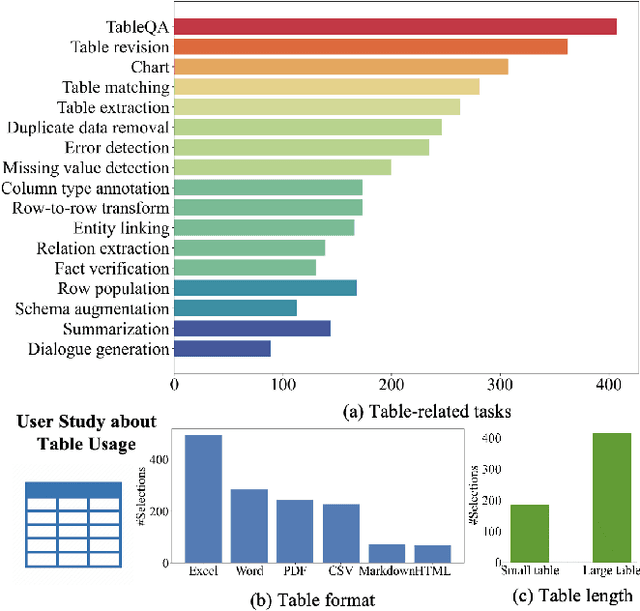
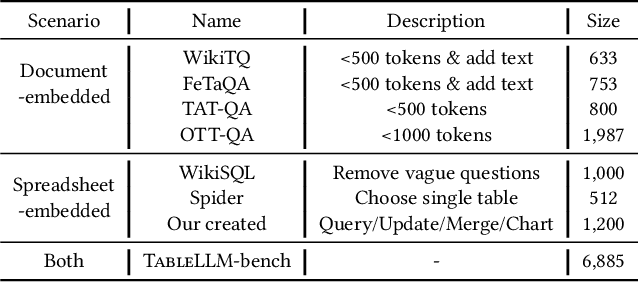
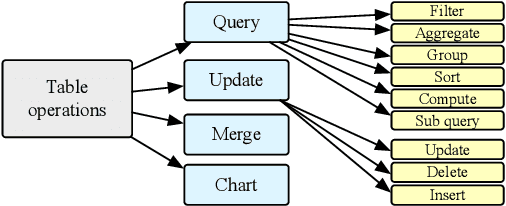
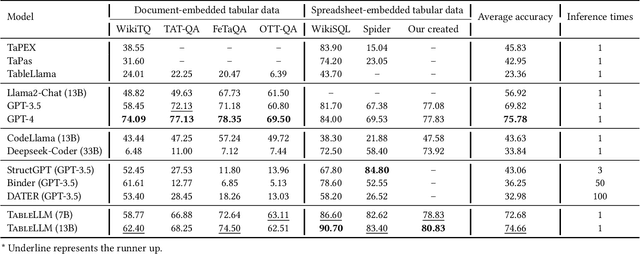
Abstract:We introduce TableLLM, a robust large language model (LLM) with 13 billion parameters, purpose-built for proficiently handling tabular data manipulation tasks, whether they are embedded within documents or spreadsheets, catering to real-world office scenarios. We propose a distant supervision method for training, which comprises a reasoning process extension strategy, aiding in training LLMs to understand reasoning patterns more effectively as well as a cross-way validation strategy, ensuring the quality of the automatically generated data. To evaluate the performance of TableLLM, we have crafted a benchmark tailored to address both document and spreadsheet formats as well as constructed a well-organized evaluation pipeline capable of handling both scenarios. Thorough evaluations underscore the advantages of TableLLM when compared to various existing general-purpose and tabular data-focused LLMs. We have publicly released the model checkpoint, source code, benchmarks, and a web application for user interaction.Our codes and data are publicly available at https://github.com/TableLLM/TableLLM.
GLM-Dialog: Noise-tolerant Pre-training for Knowledge-grounded Dialogue Generation
Feb 28, 2023
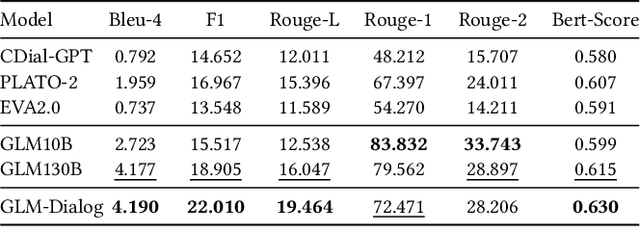


Abstract:We present GLM-Dialog, a large-scale language model (LLM) with 10B parameters capable of knowledge-grounded conversation in Chinese using a search engine to access the Internet knowledge. GLM-Dialog offers a series of applicable techniques for exploiting various external knowledge including both helpful and noisy knowledge, enabling the creation of robust knowledge-grounded dialogue LLMs with limited proper datasets. To evaluate the GLM-Dialog more fairly, we also propose a novel evaluation method to allow humans to converse with multiple deployed bots simultaneously and compare their performance implicitly instead of explicitly rating using multidimensional metrics.Comprehensive evaluations from automatic to human perspective demonstrate the advantages of GLM-Dialog comparing with existing open source Chinese dialogue models. We release both the model checkpoint and source code, and also deploy it as a WeChat application to interact with users. We offer our evaluation platform online in an effort to prompt the development of open source models and reliable dialogue evaluation systems. The additional easy-to-use toolkit that consists of short text entity linking, query generation, and helpful knowledge classification is also released to enable diverse applications. All the source code is available on Github.
 Add to Chrome
Add to Chrome Add to Firefox
Add to Firefox Add to Edge
Add to Edge